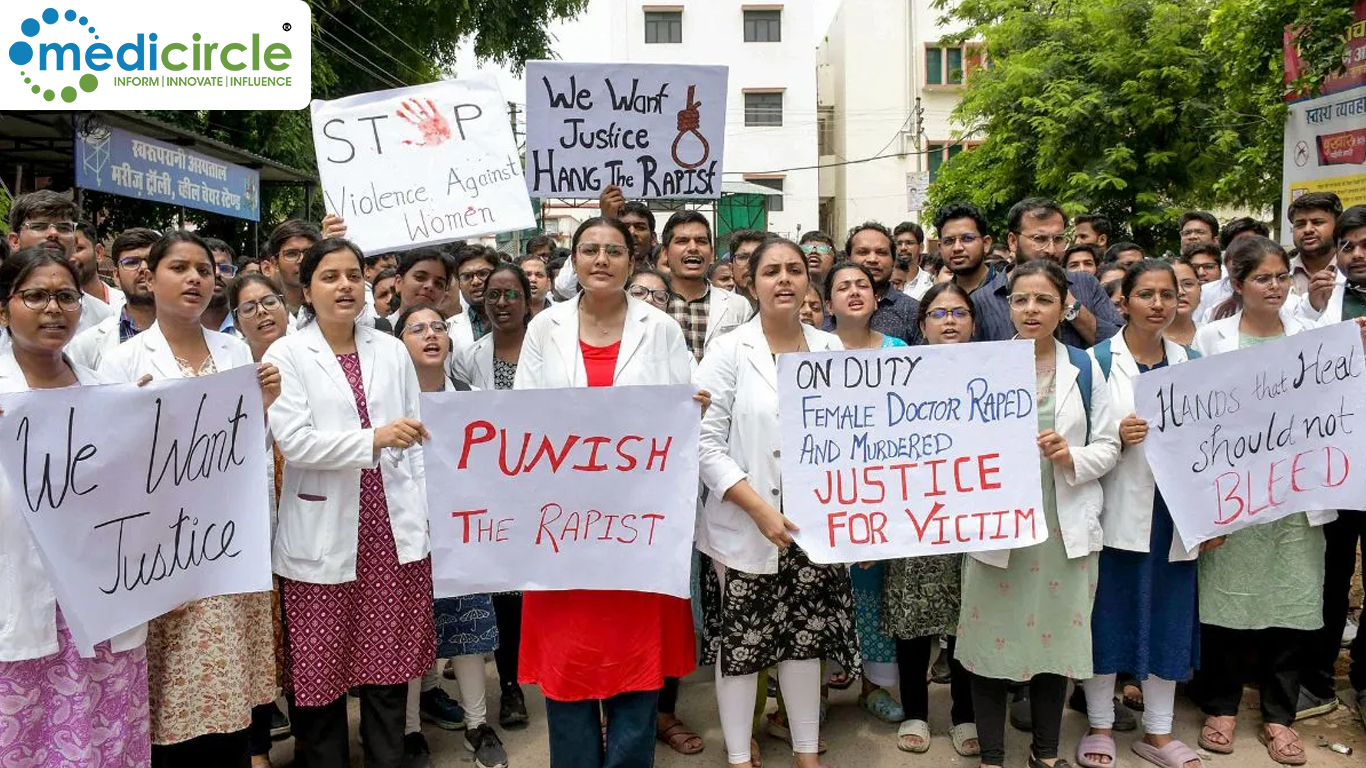A shocking and tragic event at R.G. Kar Medical College and Hospital in Kolkata has sent waves of anger and concern throughout the country. The brutal rape and murder of a doctor within the hospital premises have raised serious questions about safety and security in medical institutions.
The post-mortem report of the young doctor, released on August 9, 2024, has revealed gruesome details about the incident. The report noted ten significant injuries on the victim’s body, including severe trauma to her face, neck, and other parts of her body. Signs of sexual assault were also evident, along with bleeding from multiple areas. The cause of death was determined to be a result of “throttling” and “smothering.”
The inquest, conducted in the presence of the victim’s mother and two witnesses, further uncovered a scene of violence. Hair strands soaked in blood were found on the mattress where the crime took place, along with broken spectacles and a hair clip, pointing to a struggle.
Following the discovery of the crime, the Kolkata High Court ordered a thorough investigation by the Central Bureau of Investigation (CBI). The Kolkata Police have arrested a civic police volunteer in connection with the crime. According to police sources, the accused has been charged with rape and murder, supported by circumstantial evidence and testimonies from fellow doctors who were on duty that night.
The news of this heinous act has sparked widespread protests, particularly among junior doctors and medical professionals across West Bengal. The medical community is demanding justice for their colleague and immediate action to improve safety measures within hospitals. The incident has not only shaken the State but has also resonated with people nationwide, highlighting the urgent need for better security protocols in healthcare settings.
Rape remains a persistent issue in society, not because of the actions of women, but due to deep-seated cultural, social, and systemic failures. It’s crucial to understand that sexual violence is never the fault of the victim. Unfortunately, many societies still hold onto harmful stereotypes and victim-blaming attitudes, which perpetuate the cycle of violence. Women are often unfairly scrutinized for their choices in clothing, behaviour, or even the times they are outside, diverting attention from the true issue: the behaviour and mentality of the perpetrators.
Rape persists because of a lack of accountability, insufficient legal deterrents, and societal attitudes that often fail to condemn such acts with the severity they deserve. Each time an incident like this occurs, it is a stark reminder of the ways in which society, institutions, and the government fail to protect women and address the root causes of sexual violence.
To prevent such tragedies in the future, institutions and government agencies must take a proactive role in implementing comprehensive measures that go beyond mere security upgrades:
1. Strict Enforcement of Laws: There must be a strong enforcement of laws against sexual violence. Legal systems should ensure that perpetrators are swiftly brought to justice, and penalties should be severe enough to deter future crimes.
2. Education and Awareness: Comprehensive education programs should be implemented to teach about consent, respect, and gender equality from a young age. Awareness campaigns can also help dismantle harmful stereotypes and foster a culture that does not tolerate violence against women.
3. Institutional Accountability: Hospitals, workplaces, and educational institutions must create environments where women feel safe and protected. This includes setting up robust complaint mechanisms, conducting regular safety audits, and ensuring that all employees are aware of their rights and the procedures to follow in case of harassment or assault.
4. Support Systems for Victims: It is essential to establish support systems for victims of sexual violence, including counselling, legal aid, and safe spaces. Institutions should ensure that survivors have access to the help they need without fear of judgment or retaliation.
5. Community Engagement: Community involvement is critical in changing societal attitudes. Local leaders, religious figures, and other influential community members should actively participate in promoting gender equality and condemning violence against women.
6. Government Initiatives: Governments should invest in programs that address the root causes of sexual violence, such as poverty, lack of education, and gender discrimination. They should also ensure that policies are in place to protect vulnerable populations, including women working in isolated or high-risk environments like hospitals during late hours.
This tragic incident at R.G. Kar Medical College and Hospital serves as a grim reminder of the vulnerabilities faced by healthcare professionals, especially women, within their workplaces. As the investigation continues, there is a growing demand for swift justice and concrete measures to ensure that such a devastating event does not occur again.
The safety of healthcare professionals, and all women, must be prioritized by society at large. It is not enough to react with outrage after a tragedy occurs; proactive steps must be taken to address the underlying issues that allow such crimes to happen. By fostering a culture of respect, enforcing strict legal consequences, and providing comprehensive support for victims, we can begin to make meaningful progress toward a safer society for all.

 Rape remains a persistent issue in society, not because of the actions of women, but due to deep-seated cultural, social, and systemic failures.
Rape remains a persistent issue in society, not because of the actions of women, but due to deep-seated cultural, social, and systemic failures.










.jpeg)




.jpeg)

.jpg)













